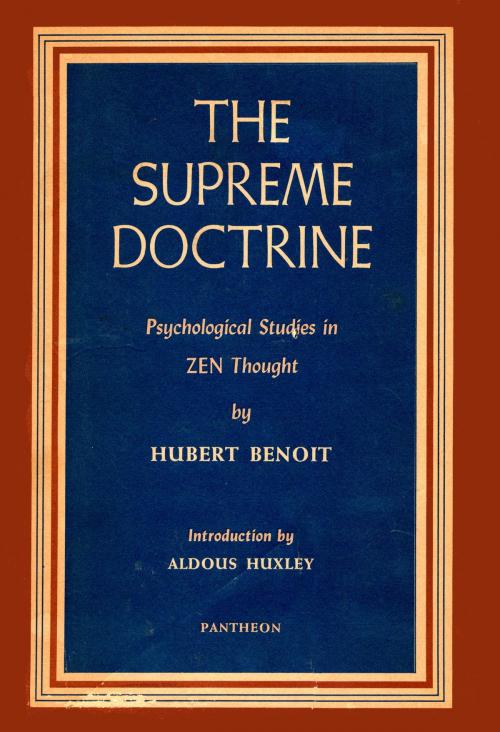The Supreme Doctrine
Psychological Studies in Zen Thought
Nonfiction, Religion & Spirituality, Philosophy, Zen, Eastern Religions, Zen Buddhism, Health & Well Being, Psychology, Applied Psychology| Author: | H. Benoit | ISBN: | 9780307831958 |
| Publisher: | Knopf Doubleday Publishing Group | Publication: | August 21, 2013 |
| Imprint: | Pantheon | Language: | English |
| Author: | H. Benoit |
| ISBN: | 9780307831958 |
| Publisher: | Knopf Doubleday Publishing Group |
| Publication: | August 21, 2013 |
| Imprint: | Pantheon |
| Language: | English |
(With an Introduction by Aldous Huxley)
In its Eastern aspects—Chinese, Hindu, and Japanese—Zen Buddhism has proved a puzzle, although a stimulating one, to the Western mind. Himself a Westerner, Dr. Benoit has approached it through an occidental manner of thinking. “For the first time, Dr. Benoit presents the traditional doctrine of Zen Buddhism in a language that is understandable to the Western world,” says one of his Indian admirers, Swami Siddheswarananda.
The author does not advocate a “conversion” to Eastern religion and philosophy. Rather, he would have Western psychological thinking and reasoning meet with oriental wisdom on an intellectual plane, in order to make it participate in the oriental understanding of the state of man in general. “I do not need to burn the Gospels in order to read Hui-neng,” says Dr. Benoit.
Zen, to be quite exact, is not so much a doctrine as a hygiene of intelligent living. As such it is presented by the author, a practicing psychoanalyst. It is a way of breaking the deadlock into which the faulty functioning of our civilization has led us, of liberating us from the prevalent contemporary sickness, anxiety. This book provides the elements for reaching “satori,” that modification of the internal functioning of man which can be described as a state of unassailable serenity. This state, Dr. Benoit makes clear, is he truly “normal” one. How to develop intelligence and will so that this transformation of life can be achieved is the subject of this book.
(With an Introduction by Aldous Huxley)
In its Eastern aspects—Chinese, Hindu, and Japanese—Zen Buddhism has proved a puzzle, although a stimulating one, to the Western mind. Himself a Westerner, Dr. Benoit has approached it through an occidental manner of thinking. “For the first time, Dr. Benoit presents the traditional doctrine of Zen Buddhism in a language that is understandable to the Western world,” says one of his Indian admirers, Swami Siddheswarananda.
The author does not advocate a “conversion” to Eastern religion and philosophy. Rather, he would have Western psychological thinking and reasoning meet with oriental wisdom on an intellectual plane, in order to make it participate in the oriental understanding of the state of man in general. “I do not need to burn the Gospels in order to read Hui-neng,” says Dr. Benoit.
Zen, to be quite exact, is not so much a doctrine as a hygiene of intelligent living. As such it is presented by the author, a practicing psychoanalyst. It is a way of breaking the deadlock into which the faulty functioning of our civilization has led us, of liberating us from the prevalent contemporary sickness, anxiety. This book provides the elements for reaching “satori,” that modification of the internal functioning of man which can be described as a state of unassailable serenity. This state, Dr. Benoit makes clear, is he truly “normal” one. How to develop intelligence and will so that this transformation of life can be achieved is the subject of this book.















